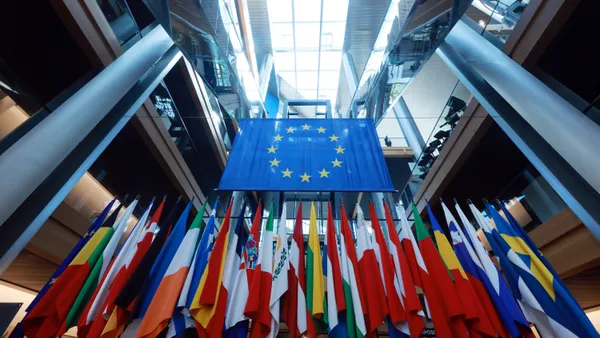The International Finance Reporting Standards Foundation, a global standard-setter for accounting and sustainability reporting, closed May with a trio of announcements that show its widening efforts to move the ESG reporting landscape forward.
IFRS runs the International Sustainability Standards Board and the International Accounting Standards Board. In the past few years, ISSB absorbed several ESG reporting organizations, including the Task Force for Climate-related Financial Disclosures. The organization released its inaugural IFRS S1 and S2 reporting frameworks last summer.
Less than a year later, IFRS said that jurisdictions representing more than half of the world’s gross domestic product are aligning or incorporating the ISSB’s standards into their legal or regulatory frameworks for corporate sustainability report. In total, 20 jurisdictions accounting for more than half of the world’s greenhouse gas emissions have signaled a level of alignment, and IFRS published a guide last week for other jurisdictions looking to do the same.
The standards received an early endorsement from the International Organization of Securities Commissions, whose membership includes 95% of global securities market regulators. IOSCO Chair Jean-Paul Servais called the publication of the guide “an important milestone” in IOSCO’s goal to establish comparable and reliable sustainability disclosures.
“I am encouraged by the fact that not even a year after our endorsement and call to action, so many jurisdictions are seeking to adopt or be informed by the ISSB Standards. The ISSB’s Inaugural Jurisdictional Guide released today will be very useful to further support jurisdictional journeys towards adoption or use,” Servais said.
Among the jurisdictions that have looked to fully incorporate or align with ISSB’s standards are the European Union’s Corporate Sustainability Reporting Directive and China’s recent draft sustainability standards. While the Securities and Exchange Commission notes similarities to the ISSB standards, it declined to recognize them as an alternative to the agency’s paused climate disclosure rule.
GRI, IFRS working towards full interoperability
IFRS and the Global Reporting Initiative — the leading sustainability reporting framework as of October 2022 — will seek to deliver full interoperability of their frameworks, GRI said May 24. While the ISSB standards provide a single-materiality framework for companies to disclose information relevant to investors, GRI’s reporting framework takes a double materiality approach.
The two organizations are independent of each other but signed a memorandum of understanding in 2022 to broadly coordinate their programs and standard-setting activities. The deepening collaboration will allow both organizations to focus on improving standards for their primary audiences.
“The ISSB’s focus continues to be on meeting the information needs of capital markets,” ISSB Chair Emmanuel Faber said in the release. “Through this collaboration companies that wish to apply both the ISSB and GRI Standards to facilitate reporting to a broader range of stakeholders will be able to do so in a seamless way.”
The deepening collaboration will first bear fruit on biodiversity disclosures. ISSB is working on biodiversity, ecosystem and ecosystem services as part of its new agenda and will build upon GRI’s biodiversity standards to develop a methodology pilot.
IASB releases amendments for ESG-loan clarity
In response to the rise of loans with ESG-linked features, IASB announced amendments to its classification and measurement guidelines for financial instruments Thursday. The updated guidelines say stakeholders asked to determine the value of loans with such features should be measured based on “the characteristics of the contractual cash flows.”
The amendments to the IFRS 9 and IFRS 7 guidelines also provide clarity for how those cash flows should be accounted for in loans with ESG-linked features.











